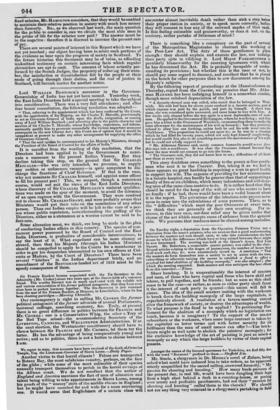Lord WILLIAM BENTINCK'S successor in the Governor- Generalship of India
has not yet been named. Yesterday week, the East India Directors held a special meeting to take the subject into consideration. There was a very full attendance; and after four hours' consultation, the following resolution was adopted- " That, referring to the appointment which has been conferred by the Court, with the approbation of his Majesty, on Sir Charles T. Metcalfe, provisionally to act as Governor-General of India upon the death, resignation, or coming away of Lord William Bentinck • and adverting also to the public character and services of Sir Charles T. Metcalfe, whose knowledge, expeuence, and talents, eminently qualify him to prosecute successfully the various important measures consequent on the new Charter Act ; this Court are of opinion that it would be inexpedient at present to make any other arrangement for supplying the office of Governor-General.
"That the said opinion be communicated to his Majesty's Ministers, through the President of the Board of Control for the affairs of India."
It is manifest from the wording of this resolution, that the Directors had been applied to by the Government to nomi- nate a successor to the present Indian Viceroy. But they decline taking this step, on the ground that Sir CHARLES METCALFE—who was only intended, we presume, to supply any sudden or unforeseen vacancy—is quite competent to dis- charge the functions of Chief Governor. If that is the case, why not nominate Sir CHARLES himself, and appoint some officer to fill his present post ? This, we suspect, though a consistent course, would not suit the views of the East India Directors; whose discovery of Sir CHARLES METCALFE'S eminent qualifica- tions was made on the spur of the moment, to avoid the dilemma of an open rupture with the Government. They were resolved not to choose Mr. CHARLES GRANT, and were probably aware that Ministers would put their veto on the nomination of any other person. Thus our Indian empire will be left to the care of a per- son whose public reputation, notwithstanding the puffing of the Directors, either as a statesman or a warrior cannot be said to be ftrst-rate.
Some alteration must, we think, ere long be made in the plan of conducting Indian affairs in this country. The species of con- current power possessed by the Board of Control and the East India Directors, is productive of cons:derable inconvenience, to say the least of it. What expedient can be more clumsy or absurd, than that his Majesty (through his Indian Minister) should be compelled to apply to the Courts for a mandamus in order to get his despatches transmitted to his own officers at Cal- cutta or Madras, by the Court of Directors? There have been several "hitches" in the Indian department lately, and an amendment of the BaotroliAm-lauded act of 1833 must be the speedy consequence of them.


















 Previous page
Previous page